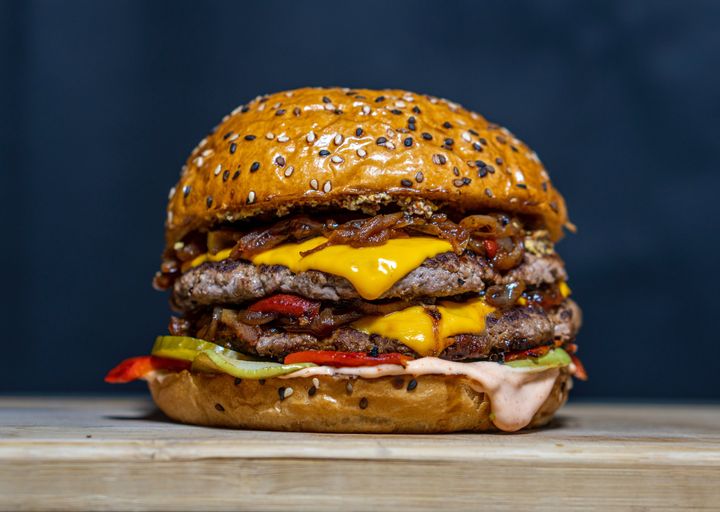Do You Have Endometriosis? These Foods And Drinks Could Make It Worse
Eleven percent of American women, as well as gender-fluid, nonbinary and transgender people, are affected by endometriosis. Symptoms can involve excruciating cramps, heavy periods, extreme bloating and pain with bowel movements or urination.
Speaking out on the condition, celebrities like Chrissy Teigen, Amy Schumer, Lena Dunham and Padma Lakshmi have been sharing their experiences and reducing the stigma.
Advertisement
While endometriosis still has no cure, there are medications or surgeries that can help reduce symptoms, as well as lifestyle changes like diet modifications. We spoke with experts to find out small ways you could try to alleviate your symptoms simply by adjusting your diet.
What is endometriosis?
“Endometriosis is a complex inflammatory condition where there is endometrial-like tissue present outside the uterus. This leads to inflammation, scarring and adhesions in the pelvic region,” said Jessica Horwitz, a certified family nurse practitioner and the chief clinical officer at Tia, a national women’s health care clinic.
Advertisement
While changing your diet won’t get rid of endometriosis, avoiding certain foods can help improve your symptoms, with a big caveat.
“Regarding diet, it is not one size fits all,” said Dr. Daniel Ginn, assistant clinical professor of obstetrics and gynecology at the University of California, Los Angeles. “Some patients’ symptoms are exacerbated by very specific foods, revealing isolated food intolerances that lead to increased inflammation of the gut — lactose and gluten are good examples, as these severely worsen symptoms in some people and have no impact on others.”
Advertisement
With that in mind, let’s dive into the top five foods and beverages that you may want to avoid if you’re experiencing endometriosis.
1. High FODMAP foods
The acronym FODMAP stands for fermentable oligosaccharides, disaccharides, monosaccharides and polyols. This complicated-sounding term refers to carbohydrates and sugars that can be difficult for the body to digest. Unlike most foods that end up on doctors’ no-no lists, FODMAPs include nutrient-dense fruits like apples and cherries, veggies like cauliflower and garlic and pulses like legumes. Dairy and gluten can also be high-FODMAP foods.
“All those fancy words above represent carbohydrates that don’t absorb well in the intestines of people sensitive to these foods,” said Amanda Frankeny, a registered dietitian. “Malabsorption attracts water into the intestine and can trigger bloating, gas, diarrhea or constipation. If a sensitive tummy and gut happen alongside your endometriosis, a low-FODMAP diet approach is often recommended to figure out what’s prompting motility problems and stomach pain.”
Your doctor may suggest you try a FODMAP diet, in which foods are eliminated and then reintroduced to see if your symptoms flare.
“A registered dietitian can best guide on this in a more systematic way,” Ginn said. “In many cases, moderating certain foods in the diet rather than full, permanent elimination is sufficient.”
Advertisement
2. Lactose and gluten
Often demonized in wellness circles, lactose and gluten can trigger symptoms because “endometriosis is a systemic inflammatory condition … gluten, dairy, lactose can exacerbate this inflammation and worsen endometriosis symptoms,” Horwitz said.
However, research from Frontiers in Nutrition found that more than three servings of milk, yogurt, kefir, skyr, cheese or other dairy foods per day might be associated with a lower risk of developing endometriosis. So it’s important to assess your specific diet and symptoms with a doctor.
3. Trans fat
Trans fat is considered so unhealthy that it was banned in food products in the United States in 2020. Despite the ban, deep-fried foods and products that contain less than 0.5 grams of trans fat per serving can still be marketed as zero, meaning we can still consume the stuff. While an occasional donut or piece of fried chicken isn’t cause for alarm, research has found that trans fat and sugar can increase inflammation and the risk of endometriosis.

novanym 95 / 500px via Getty Images
4. Red meat
Cutting back on red meat is often thought to be better for our health and the planet. A 2018 prospective cohort study found that chomping down on a burger or gnawing on a steak can make your endometriosis symptoms worse. That same study found that women consuming more than two servings of red meat per day had a 56% higher risk of developing endometriosis.
Advertisement
“Additionally, we know that endometriosis is a disease driven by estrogen, so trying to minimize estrogen-active foods such as red meat may also be helpful,” said Dr. Gabrielle Whitmore, an assistant professor of OB-GYN and OB health at the University of Colorado Anschutz Medical Campus. “Most of us have heard that increasing dietary fiber is great for your bowel movements, but it can also reduce estrogen in the bloodstream and, therefore, may be useful in reducing symptoms of endometriosis as well.”
5. Alcohol
Although we may know that alcohol is bad for us, more than half of Americans drink at least every once in a while. Women with endometriosis may find a flight of beers or a few cocktails after work especially difficult to stomach since alcohol can change the way their body metabolizes estrogen and lead to higher levels of the hormone.
“Gulping down alcohol can become a routine, causes inflammation and interacts with estrogen formation associated with endometriosis symptoms,” Frankeny said.
A 2012 meta-analysis that was updated two years ago found that folks who drank fewer than seven drinks a week had a 22% increased risk of endometriosis. While the link between the two isn’t too strong, moderating your alcohol consumption still has tons of benefits.

Comments are closed.